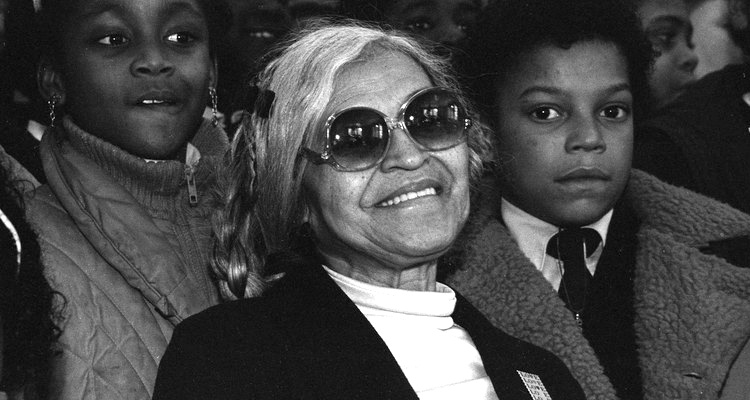Anticipation swept the O’Shaughnessy Educational Center auditorium Tuesday, Feb. 11, 1986. At 1:05, as part of a weekly lecture series sponsored by the student government, the St. Thomas community welcomed civil rights activist Rosa Parks to campus.
In an article for The Aquin the following week, reporter Sean Higgins wrote, “Parks was not bitter, but spoke with a great deal of regret for the ‘oppressive racial segregation’ in the (U.S.).” She also “spoke hopefully of the current movement,” he said, quoting the activist: “I have faith and hope and confidence that one day, the good will overcome the evil and we will know what we call and what Dr. King mentions as the ‘beloved country.’”
Parks accepted cards from elementary school students in attendance and an award from the Minnesota State Legislature. Her encouraging words added to “Apartheid Awareness Week,” the campus-wide event to recognize the atrocities transpiring in South Africa at the time.
Historical myth often portrays Parks, born in 1913, as an unassuming, quiet seamstress whose tired feet motivated her to refuse her bus seat to a white man in Montgomery, Alabama; however, Parks, in her 1992 autobiography, “Rosa Parks: My Story,” gives a more salient version of those December 1955 events: “I was not tired physically … No, the only tired I was, was tired of giving in.” After a childhood filled with stories about the fight for equal rights, Parks had spent her adult life defending unjustly accused African-Americans throughout Alabama, hosting Voters’ League meetings and serving in the Montgomery chapter of the NAACP, where she investigated and documented cases of racism and sexism.
Following Parks’ refusal of her seat and consequent arrest, the Montgomery African-American community, under the galvanizing leadership of the Rev. Martin Luther King Jr., organized a boycott of city buses, which ended a year later with the November 1956 Supreme Court ruling that bus segregation was unconstitutional.
Parks moved to Detroit in 1957 and continued to work toward equal rights and fair treatment for all, including the creation of the Rosa and Raymond Parks Institute for Self Development in 1987 as a tribute to her late husband. She died in 2005 at the age of 92.
Positivity permeated Parks’ life work, as she showed the St. Thomas crowd on that frigid February 1986 afternoon: “It is very gratifying to know … that if we continue the struggle, perhaps there would be, in time, no need for the type of demonstration, the type of struggle that we have had to face over the years.”
While the struggle isn’t yet complete, perhaps Parks’ words can continue to touch each of us as we work for justice and peace.
Student Diversity and Inclusion Services is hosting events throughout February in celebration of Black History Month. Find the details here.
Depth of Field Icons brings you historical images of noteworthy cultural, political or artistic personalities who have visited campus.
Read more from Depth of Field.







